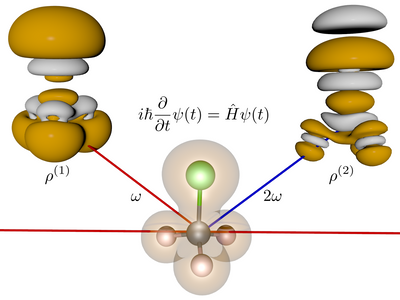The course provides comprehensive presentations of time-dependent response theory and electrodynamics. Response theory is explored in the time and frequency domains and with use of different quantum mechanical formulations. Electrodynamics is targeted towards an understanding of internal and external field interactions in/with molecular systems. More applied lectures cover presentations of linear and nonlinear optical properties, vibrational spectroscopies, UV/vis and X-ray absorption spectroscopies and birefringences, and magnetic resonance spectroscopies.
FKE3150 Molecular Response Theory and Spectroscopy 5.0 credits

This course encompasses three components: (i) preparatory studies, (ii) an intense international PhD school somewhere in Europe or the USA, and (iii) independent problem solving that also acts as examination.
The international PhD school is organised by Trond Saue, Kenneth Ruud and Patrick Norman who have their backgrounds in the development and application of response theory methods in quantum chemistry. Applications include electric and magnetic spectroscopic properties of molecules, including linear and nonlinear interactions.
Information per course offering
Course offerings are missing for current or upcoming semesters.
Course syllabus as PDF
Please note: all information from the Course syllabus is available on this page in an accessible format.
Course syllabus FKE3150 (Spring 2019–)Content and learning outcomes
Course contents
Intended learning outcomes
To understand the theory for interactions between
light and molecular systems, including
- how classical electrodynamic fields are introduced
in the quantum mechanical Hamiltonian - how one from the Schrödinger ekvation determines
response functions in the frequency domain - how a selection of response functions couples to
spectroscopic observables
Literature and preparations
Specific prerequisites
Literature
Examination and completion
Grading scale
Examination
- HEM1 - Home assignment, 5.0 credits, grading scale: P, F
Based on recommendation from KTH’s coordinator for disabilities, the examiner will decide how to adapt an examination for students with documented disability.
The examiner may apply another examination format when re-examining individual students.
If the course is discontinued, students may request to be examined during the following two academic years.
Examiner
Ethical approach
- All members of a group are responsible for the group's work.
- In any assessment, every student shall honestly disclose any help received and sources used.
- In an oral assessment, every student shall be able to present and answer questions about the entire assignment and solution.